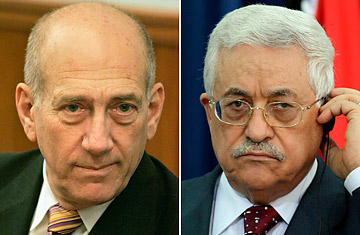Abbas, Olmert meet last time before Israel's Kadima primary
 Ramallah - Israeli Prime Minister Ehud Olmert met Palestinian President Mahmoud Abbas on Tuesday evening for their last talks before his ruling Kadima party chooses a new leader.
Ramallah - Israeli Prime Minister Ehud Olmert met Palestinian President Mahmoud Abbas on Tuesday evening for their last talks before his ruling Kadima party chooses a new leader.
Olmert's offices indicated the meeting at Olmert's West Jerusalem residence late Tuesday went well. The Kadima primary is Wednesday.
The leaders focussed on the status of peace talks between Israel and the Palestinians which were renewed in January with a view to implementing the first phase of the international "road map" peace plan.
Israel's blockade of the Gaza Strip was also to have been on the agenda.
Olmert has warned of heavy consequences if both sides do not quickly come to agreement.
The meeting may have been Olmert's last with Abbas if his Kadima successor succeeds in a quick formation of a new government. Otherwise, Olmert could still meet again with Abbas as prime minister up until elections in March 2009.
The parley had been expected to be business as usual, senior Palestinian negotiator Saeb Erekat said beforehand. He said that Palestinians would work with Israel's prime minister for as long as he continued to serve.
"Leaving or not leaving," Erekat told Voice of Palestine Radio, "we work with the prime minister of Israel and we will continue to do so."
But Erekat emphasized that the "pursuit of peace will continue, but our peace will not be at any price."
President Abbas, he said, was to stress to Olmert that he will not accept any interim or partial agreement.
"We either agree on everything or nothing," Erekat said.
Olmert has said he will resign after the Kadima primary chooses a new leader, allowing his successor to form a new coalition.
But he could continue to serve at the head of a transitional government until the new government is formed, or until new elections are held by March 2009 if this fails.
Olmert and Abbas agreed late last year to end a seven-year freeze in the peace process and have since met on a regular basis.
They have set an end-of-year deadline for reaching a peace deal.
But while Olmert wants an agreement that leaves a settlement on the highly-sensitive issue of Jerusalem for later, the Palestinians have vehemently rejected this.
"There are territories occupied in 1967, which include Jerusalem, and we want Israel to admit that," he said. "The goal of the peace process is Israeli withdrawal to the 1967 borders."
Israel captured the West Bank and East Jerusalem from Jordan and the Gaza Strip from Egypt during the Six-Day War of 1967.
Meanwhile, chief Palestinian negotiator Ahmed Qureia told leaders of his Fatah party on Monday night he did not believe an agreement would be reached with Israel before the end of this year. (dpa)